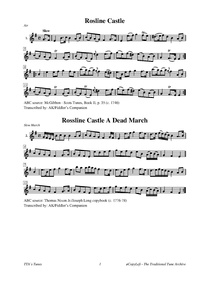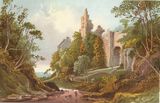Template:Pagina principale/Vetrina

Played by: Rob MacKillop
Source: Soundcloud
Image: Roslin Castle, Midlothian.

The title is variously given as Rosland, Rosline, Roseland, Roslin and Rosslyn Castle. The melody is a British march used by the English army during the (American) Revolutionary War period, says Winscott (1970).
Camus (1976) states the tune was the melody most often associated with funerals during the Revolution, and notes that legend has it that it was played by Scottish bagpipers stationed in New York at the time, in honor of the castle at Roslyn, Midlothian, Scotland.
It was perhaps in a funereal state of mind that British troops in 1781 played the tune as they marched out the small Long Island, New York, village of Hempstead Harbor. The oppressed residents, however, rejoiced at the sound, and remembering this, in 1844 their descendants changed the name of their village to Roslyn. The Continental forces also employed the tune as a memorial air.
For example, during the 1779 campaign against the Iroquois Six Nations two men had been dispatched by tomahawks and left to lay. After they were found a Colonel Proctor ordered his musicians, in passing the spot, to play “Roslin Castle,” whose “soft and moving tones” silenced the regiment and awakened pity for their comrades (Rev. William Roger’s Journal, p. 35).
“Rossline Castle, a Dead March” was entered into the c. 1776-78 music copybook [1] of fifer Thomas Nixon (Framingham, Conn.). Nixon was a thirteen-year-old who accompanied his father to the battles of Lexington and Concord, and who served in the Continental army in engagements in and around New York until 1780, after which he returned home to build a house in Framingham.
The copybook appears to have started by another musician, Joseph Long, and to have come into Nixon’s possession. The dirge was played as especially appropriate when Washington's Farewell Address was read to the troops encamped at Newburgh, New York, on their disbandment in 1783
...more at: Roslin Castle - full Score(s) and Annotations
X:5 T:Rosline Castle,2voices. JGi.007 S:Joshua Gibbons MS,1823,Tealby,Lincs. M:C L:1/8 R:Air Q:1/4=90 O:Tealby,Lincolnshire Z:VMP/R.Greig, 2009 K:Dm V:1 clef=treble name="6." [V:1]|:F>E|D2 A>B A2G>A|{GA}BAGF E2F>E|D2d>e {de}f2e>d|cdec A2GA| [V:2]|:z2|z2FGF2EF|GFED ^C2z2|z2FGA2GF|E2A2A,2DE| [V:1]BAGF E2F>G|AFEDH^c2d>e|fde^c dA G/2B/2A/2G/2|F2 E>D D2:| [V:2]GFED C2DE|FDGFHA2FG|AFGD FD E2|A2A,2D2:| [V:1]A2|d^cde{de}f2e>d|a2gf e2d^c|dAde {ef}f2e>d|a>g f/2a/2g/2f/2 e2GA| [V:2]E2|F2FAd2A2|fed2FEz2|FEFAd2A2|fe d/2e/2f/2e/2A2EF| [V:1]BAGF E2FG|AFEDH^c2de|fde^c dA G/2B/2A/2G/2|F2 E>D D2:| [V:2]GFEDC2DE|FDGFHA2FG|AFGE FDE2|A2A,2D2:|
